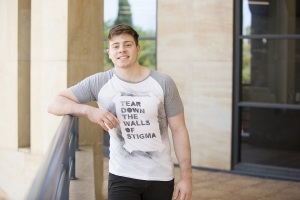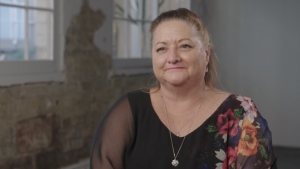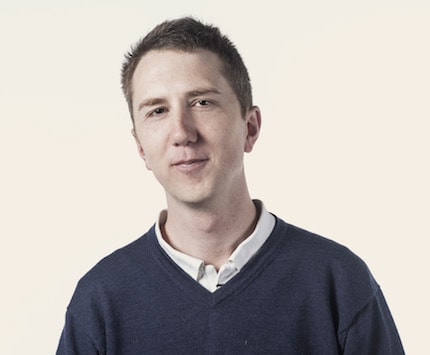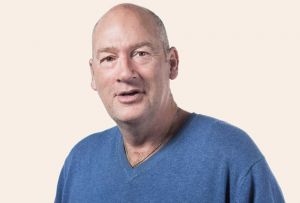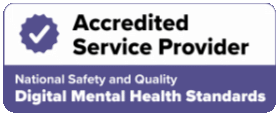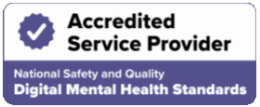Accessibility Tools
- Content scaling 100%
- Font size 100%
- Line height 100%
- Letter spacing 100%
Displaying items by tag: obsessive compulsive disorder
Joshua: challenging stereotypes of masculinity
As a SANE Peer Ambassador, I’m so proud to be part of a national network of nearly 100 people who all share a common goal of reducing stigma and discrimination for those living with complex mental health issues.
I joined the Peer Ambassador program because I wanted to use my lived experience of obsessive compulsive disorder (OCD) to help others living with complex mental health issues, and the people who support them. Through sharing my journey, I want to break down the stigma and talk about the impact that mental ill health can have on the lives of Australians. OCD is not a personality trait or simply another way of saying that you’re extremely tidy or clean, but a serious mental illness that up until recently silenced me in everyday life.
The training to become a Peer Ambassador was really special. It was the first time I truly realised the power of storytelling and connected with other lived experience advocates.
One of the best things was that I felt accepted for me, and that my story was valued. The level of understanding and support SANE has for my specific needs creates such a great space to be an advocate in. I truly feel like I am following a passion. The program has provided me with mentoring not just in my advocacy journey, but in everyday life. I previously took part in a campaign focussed on mental health in young adults called Be Kind to Your Mind. I was able to share my story in a way I initially thought I wouldn’t do, using short social media videos. The training around this campaign taught me useful skills in dealing with others’ opinions, not just online, but in any advocacy engagement. With every opportunity I have been involved in I’ve learnt new life skills and become more confident in expressing my story. Along with this, hearing the experiences of other Peer Ambassadors from across the country has provided me with a greater understanding of other complex mental health issues.
Sharing what happens to us when we experience illness, distress, stigma or trauma can be difficult. But there is such power in hearing someone’s candid, first hand experiences, which the program supports members to do in a safe and impactful way.
Today, because of organisations like SANE, there’s a lot more awareness of mental health issues, but there is still a long way to go when it comes to reducing stigma, increasing mental health literacy and help seeking behaviours.
As a young man in the sporting industry, talking about mental health can be seen as a weakness. But as I continue to develop my advocacy skills as part of the Peer Ambassador program, I’m finding that I’m having more and more positive conversations about what it means to live with a complex mental health issue and I’m challenging stereotypes of masculinity and emotional vulnerability. It’s so important, especially as young people, to challenge outdated views, stand up for what we believe in and be the change we want to see in this world.
Radio station changes conversation around OCD
Issue: StigmaWatch received a report about presenters on a major metropolitan radio program joking about obsessive compulsive disorder (OCD). The segment breached Mindframe’s national media reporting guidelines and reinforced inaccurate stereotypes about OCD.
Result: SANE contacted the station and producers agreed to interview SANE Speaker Tim the following day to share his story about the realities of living with OCD to help educate the presenters and their listeners.
One listener contacted StigmaWatch said, ‘I just wanted to thank you for your response to the appalling lightness that was made of OCD. Perhaps if those people on such high-rating radio shows and knowing the size of their audience, knew more stories like this, they could do more good rather than make such a joke of it.’
This was an example of StigmaWatch, the community and the media working together to change the conversation that was being had around a complex mental illness.
Obsessive Compulsive Action Figure
An ‘Obsessive Compulsive action figure’ made by Accoutrements in the U.S.A. has been stocked by several Australian retail outlets. The action figure wears white gloves and comes with a surgical mask and a sanitary moist towelette. The packaging lists ‘A day in the life of OC action figure’ including entries such as ‘7.35am brushes teeth, disposes of toothbrush’. There is also a joke checklist for customers to determine if they have OCD.
OCD is often misunderstood and reduced to hyper-cleanliness at the expense of those who live with it.
This product has been stocked by Faboo store, Newslink and Urban Attitude. Newslink has discontinued the line.
StigmaWatch contacted Faboo and Urban Attitude to pass on the views of customers who said the toy mocked and trivialised a mental illness that is often debilitating. StigmaWatch explained that many community members do not welcome this import and encourage Australian retailers to reject it.
Julie
Living with OCD is a living hell. As a child, I felt I had to keep my family safe, but I didn't know why. If I made a mistake at school I had to rip the pages out and start again, or I felt something terrible would happen to someone I loved. Even though I knew deep down what I was doing didn’t make sense, I couldn't take the chance that somebody might die.
Leaving the house could take me two hours because I would check everything was off. My long-suffering husband had to reset the microwave, alarm clock and video recorder every night. I would boil everything before l cooked. It was just so time consuming. I was doing all sorts of things to keep my family safe and it would take up hours and hours of time.
People think it’s just about cleaning. They don’t understand the anxiety, and that’s the worst part. The thought is going round and the anxiety builds up — people don’t realise how awful that anxiety is.
People with OCD know that what we’re doing is irrational — that’s why we hide it. People will see some of our rituals but most of it is hidden. You look at the person beside you and they’re not washing their hands ten times or tapping the walls before they leave a room, but they may have OCD and they may be hiding their rituals.
Before I got treatment, my husband did everything for me. He’d help me shower, help me dress because I thought that even if I’d put my clothes on the wrong way somebody would die.
I didn’t manage my symptoms well. I let them run free unless someone was watching. Deep down we know what we’re doing is irrational, but you have to do it because you need to save somebody’s life or not get sick, or whatever your OCD thought is.
My husband suggested I see the GP when I was 28 years old as he could no longer live the way we were living. He was flicking through a magazine at work, read a story about people with OCD and thought, this is you! You’re doing what they’re doing. We went to the GP the next morning. The GP said he’d never heard of it before.
Finding out what I had was incredible. It was life-changing. I had been seeing a psychiatrist for two years who never once mentioned OCD — so I got progressively worse.
Once I finally found out what I had, I did treatment every day for three weeks and spent two hours each day with the psychologist. We used to go to the funeral parlour, the hospice and the cemetery, to dispel that feeling that if I had anything to do with death, somebody might die.
I don’t know if I would have been so brave to go for treatment if I’d have known what I was going to have to have to do. Going to funeral parlours and cemeteries would have terrified me.
I’ve lived 28 years free of OCD. It’s still there though. I think it's like being an alcoholic — you might not have a drink for 30 years but you’re still an alcoholic because occasionally I’ll get an OCD thought. It doesn’t worry me, it doesn’t send me into rituals. But I think if I gave into it, it would all come back — it’s very, very strong.
But you can live really well if you get the right treatment for OCD. I got my life back after treatment, it was just amazing.
I stopped reading when I was about 16 because I’d get to the end of a sentence and think, ‘Did I stop at that comma? Did I say that word? Better read that sentence again.’ I could get stuck on that paragraph for a week.
After five years of treatment, I got a book for Christmas and I was sitting there, reading it and I started to cry. And my husband said, ‘Is it a sad book?’ and I said, ‘No, I’m reading. I can’t believe it!’ To get your life back, to get that treatment — it’s hard but it’s worth it.
Having recovered from OCD, my life is completely different. Prior to treatment I stopped socializing or having any sort of relationships. After treatment, I can walk out of that house without checking, I don’t have to wash constantly, I don’t have to be ringing up checking everybody’s health constantly.
I can go out, I have a beautiful daughter, we can go out to the theatre, I can make dinner — it’s really freeing. I can do things that everyone else does.
Jock
TW: This article mentions suicide.
Jock is a fit, healthy man. A man who runs marathons. A public speaker. A man filled with the joy of life, and yet only a few years ago he was barely functioning as a human being.
Jock's mother, Dianne, describes him in those days as ‘overweight, depressed and lethargic, sometimes sleeping 20 out of 24 hours’.
‘It was a desperate, awful time,’ she says. ‘Jock probably weighed about 170 kilos. He was bloated, and looked terrible. He had no social life or social skills, and had trouble taking anything in or communicating. We were in despair.’
In his early twenties, Jock had been diagnosed with Schizophrenia, Obsessive-compulsive disorder and Anxiety. The years passed, and Jock showed no signs of improvement. His mother, two sisters and brother were beside themselves.
‘Whenever I called the clinic over my concerns, they just increased the dosage of Jock's medication,’ Dianne says.
Dianne, a strong and remarkable person, knew there must be an answer somewhere. She refused to listen to well-meaning people who told her Jock should go into an institution.
It was then she discovered a local community organisation, ERMHA (Eastern Regional Mental Health Association) which supports people with mental illness in a number of ways. Dianne persuaded Jock to go to their drop-in centre a few days a week.
‘It was a huge step,’ Dianne says.
While he was at ERMHA one day, Jock had a blackout and wandered off. He ended up in hospital. A neurologist was horrified at the amount of medication Jock was taking. Tests showed there was nothing neurologically wrong with Jock and that the cause of many of his symptoms was the excessive amount of drugs he was prescribed.
Dianne took Jock back to the clinic where he had been given the medication and saw a psychiatrist who read Jock’s history and threw out all but one of his tablets.
‘Within three months of the change in his medication, Jock took over his own life. He didn’t look back.’
At the same time, Jock’s GP referred him to a psychiatrist to deal with the Obsessive-compulsive disorder. ‘This worked brilliantly,’ says Dianne.
Jock started to feel alive again.
The combination of symptoms and side-effects of medication had given him a craving for caffeine, cigarettes, alcohol and junk foods. He decided to lose weight, quit smoking and drinking and improve his diet.
‘I did this myself,’ he says, ‘but got fantastic support from my family.'
He asked his brother-in-law Jason to help him get fit. They started with a run round the block. ‘We did about half,’ says Jock. ‘I was so out of puff it wasn’t funny.’
At the time Jock recalls thinking, ‘I don’t know if I can do this’. But he made himself take what he calls baby-steps – boxing practice or a short run – every day, and set himself the seemingly-impossible goal of running a half-marathon within a year. Amazingly he did it, and he and Jason raised $10,000 for SANE. They were among the top four fundraisers out of more than 17,000 participants.
On tough days Jock thought of his friend Pete who had ended his life. ‘He had Bipolar disorder and his death was a terrible shock. I knew he’d be happy about how I was going and it kept me on track.’

At the same time as he was getting stronger physically, Jock was enriching his life via ERMHA.
He took a couple of catering courses there and was accepted for the 20-week ‘Life Skills’ program run by the MadCap Café, a non-profit organisation helping people with mental illness re-join the workforce.
Jock now has a permanent part-time job there and loves it.
‘For years I found it difficult to communicate,’ he says, ‘but working with customers, especially, means my confidence has really soared.’
Jock was invited to speak at the official opening of a new MadCap Café. He shook with nerves but afterwards felt good.
‘I would like to speak in public more often,’ he says, ‘I want to help people who are in the same position I was, because if I can change my life around, anybody can.’
To overcome his nerves Jock has joined Toastmasters and to his delight has been asked to speak at the opening of a third MadCap Café.
Jock has taken up yoga and meditation, which he finds therapeutic, and keeps up his physical fitness by cycling and going to the gym.
Dianne now sees herself as a backstop in Jock’s life and is thrilled. 'I give him a good home base and support the decisions and choices he is making,’ she says.
She believes if he had stayed on the unnecessarily heavy doses of medication he might be dead by now. ‘As it is, he is now this lovely, intelligent, bright, beautiful person.’ She says.
She points out that Jock’s sister Julianne – Jason’s wife – is 14 years younger than him and only ever knew him as unwell. ‘She keeps looking at him and says she now has a wonderful big brother in her life.’
‘His other sister Andrea knew Jock before he became sick,’ she adds, ‘and tears well up in her eyes when she sees him with her kids.’
For the family, Jock’s transformation is a miracle. As he says himself, ‘I used to exist but now I have a life.’
Where to from here?
- For 24/7 support if you're stuggling, contact Lifeline on 13 11 14 or Suicide Call Back Service on 1300 659 467.
- To chat with a supportive online community who get it, head over to our Lived Experience Forum. Start connecting today.
Obsessive compulsive disorder (OCD)
Quick facts
-
Obsessive-compulsive disorder (OCD) involves intrusive thoughts, images, or impulses (obsessions) and repetitive actions or rituals (compulsions).
-
Symptoms can be exhausting and interfere with daily life.
-
People living with OCD can benefit from self-help strategies, psychological therapies, and medication.
-
People living with OCD can have full and meaningful lives.
-
About OCD
OCD involves recurring and unwanted thoughts, images, or impulses (obsessions) and repetitive actions or rituals (compulsions). Obsessions and compulsions can interfere with relationships, education, employment, and other areas of life.
People living with OCD are usually aware that their symptoms are irrational or excessive, but they find the obsessions uncontrollable and the compulsions almost impossible to resist.
OCD sometimes co-occurs with other mental health issues, most commonly anxiety disorders, depressive disorders, impulse-control disorders and substance use disorders1.
-
Symptoms of OCD
People living with OCD experience obsessions, compulsions, or both. Many people experience a cycle of obsessions and compulsions, where they attempt to suppress or ‘neutralise’ obsessions through compulsions2. But, the intrusive thoughts don’t completely go away, and the cycle continues.
Symptoms of OCD usually appear in late adolescence or early adulthood and can be difficult to control. They can be exhausting and time consuming.
-
Obsessions
Obsessions are recurrent thoughts, urges, impulses or images2. They are usually intrusive and unwanted, and cause anxiety or distress.
They are often exaggerated or more intense versions of concerns and worries that most people have from time to time. However, people with OCD have trouble letting go of these worries, or seeing them as harmless thoughts – they are experienced as intense, important, and highly unacceptable3.
-
Common obsessions include:
- Fear of contamination from germs, dirt, toxins, and other substances
- Fears of harm to oneself, or to others
- Intrusive sexual or violent thoughts
- Concerns with symmetry, order, and routine
- Concerns about spirituality or religious issues.
Although some people with OCD have intrusive thoughts around harming others, this doesn’t mean they actually have any desire to harm others, or are likely to be violent4.
-
Compulsions
Compulsions are repetitive actions or thoughts2. They occur in response to an obsession, or in response to rigid rules, to reduce distress or prevent an anticipated event or situation. Engaging in compulsions may temporarily reduce feelings of anxiety or fear that result from an obsession.
Sometimes a compulsion is clearly and logically linked to an obsession, but other times the link may be unclear to an outsider. Common compulsions include:
- Excessive handwashing or cleaning
- Repeated counting and ordering of objects
- Excessive checking of locks, electrical appliances, and other things associated with safety
- Touching, tapping, counting, or moving in a certain way or a certain number of times
- Mentally repeating words or numbers a certain number of times.
-
Causes of OCD
There is no single cause of OCD. It is likely to be a combination of neurological, genetic, cognitive and behavioural factors (3). Some people with OCD have experienced traumatic events, and stressful situations can trigger its onset 5.
-
How common is OCD?
In Australia, it’s estimated that around 3% of adults experience OCD each year6.
-
Managing life with OCD
People with OCD may find different strategies helpful to manage obsessions and prevent compulsions, such as:
- Understanding more about OCD, how it develops, and what maintains it
- Establishing a support network of friends or family members
- Learning strategies to manage unhelpful and intrusive thoughts
- Mindfulness, relaxation, and breathing training
- Peer support.
-
Treatment and support for OCD
Treatment can help manage, reduce, or even eliminate the symptoms associated with OCD.
It’s a good idea to first talk to a GP. A GP can provide information and referrals for treatment and support options.
Treatment often involves working with a mental health professional such as a psychologist, counsellor, or psychiatrist. Treatment can have a range of goals, such as understanding more about OCD, and reducing obsessions and compulsions.
Specific psychological therapies have been designed and tested to help people manage symptoms of OCD. Exposure and response prevention (ERP) is often recommended, and usually incorporated into cognitive behavioural therapy (CBT) for people with OCD 7,8. ERP can be provided in both individual and group settings. It involves gradually exposing a person to feared thoughts and situations, while they avoid engaging in compulsions. Other types of CBT can also be helpful9.
Some people also benefit from medication such as antidepressants. Sometimes, people are prescribed medication alone, or in combination with therapy. Often, medication is used for people with more severe OCD symptoms, or to help someone with OCD to feel in a more positive frame of mind to tackle psychological therapies 7.
-
Help for family & friends
The family and friends of someone experiencing OCD need care and support too — it’s okay for family and friends to prioritise their own physical and mental health.
There are many other people out there who share similar experience, and many services designed to help carers of people with mental health issues. Check out our Guide for Families and Friends for more info.
Effective support is available, and a person who is experiencing OCD can live a fulfilling life.
To connect with others who get it, visit our online Forums. They’re safe, anonymous and available 24/7.
-
Resources and support
- Meet Tim – real story about living with OCD
- Online OCD treatment is available through This Way Up and Mental Health Online ‘OCDStop!’
- For support with managing suicidal thoughts, contact Suicide Call Back Service – 1300 659 467 or Lifeline – 13 11 14
-
References
1. Ruscio AM, Stein DJ, Chiu WT, Kessler RC. The epidemiology of obsessive-compulsive disorder in the National Comorbidity Survey Replication. Mol Psychiatry. 2010;15(1):53–63.
2. American Psychiatric Organization. Diagnostic and statistical manual of mental disorders (DSM-5®). American Psychiatric Pub; 2013.
3. Abramowitz JS, Taylor S, McKay D. Obsessive-compulsive disorder. The Lancet. 2009;374(9688):491–9.
4. Veale D, Freeston M, Krebs G, Heyman I, Salkovskis P. Risk assessment and management in obsessive–compulsive disorder. Advances in psychiatric treatment. 2009;15(5):332–43.
5. Dykshoorn KL. Trauma-related obsessive-compulsive disorder: a review. Health Psychol Behav Med. 2014/04/23. 2014 Jan 1;2(1):517–28.
6. Australian Bureau of Statistics. National Study of Mental Health and Wellbeing 2020-2021 [Internet]. 2022 [cited 2022 Aug 4]. Available from: https://www.abs.gov.au/statistics/health/mental-health/national-study-mental-health-and-wellbeing/2020-21#prevalence-of-mental-disorders
7. National Institute for Health and Care Excellence. Obsessive-compulsive disorder and body dysmorphic disorder: treatment. 2005.
8. Ferrando C, Selai C. A systematic review and meta-analysis on the effectiveness of exposure and response prevention therapy in the treatment of Obsessive-Compulsive Disorder. J Obsessive Compuls Relat Disord. 2021;31:100684.
9. Skapinakis P, Caldwell DM, Hollingworth W, Bryden P, Fineberg NA, Salkovskis P, et al. Pharmacological and Psychotherapeutic Interventions for Management of Obsessive-compulsive Disorder in Adults: A Systematic Review and Network Meta-analysis. Focus (Madison). 2020;19(4):457–67.
